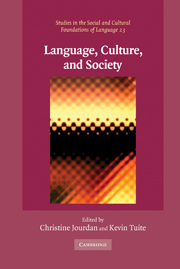Book contents
- Frontmatter
- Contents
- List of tables
- List of contributors
- Acknowledgments
- Introduction: Walking through walls
- 1 An issue about language
- 2 Linguistic relativities
- 3 Benjamin Lee Whorf and the Boasian foundations of contemporary ethnolinguistics
- 4 Cognitive anthropology
- 5 Methodological issues in cross-language color naming
- 6 Pidgins and creoles genesis: an anthropological offering
- 7 Bilingualism
- 8 The impact of language socialization on grammatical development
- 9 Intimate grammars: anthropological and psychoanalytic accounts of language, gender, and desire
- 10 Maximizing ethnopoetics: fine-tuning anthropological experience
- 11 Interpreting language variation and change
- References
- Index
- STUDIES IN THE SOCIAL AND CULTURAL FOUNDATIONS OF LANGUAGE
11 - Interpreting language variation and change
Published online by Cambridge University Press: 16 November 2009
- Frontmatter
- Contents
- List of tables
- List of contributors
- Acknowledgments
- Introduction: Walking through walls
- 1 An issue about language
- 2 Linguistic relativities
- 3 Benjamin Lee Whorf and the Boasian foundations of contemporary ethnolinguistics
- 4 Cognitive anthropology
- 5 Methodological issues in cross-language color naming
- 6 Pidgins and creoles genesis: an anthropological offering
- 7 Bilingualism
- 8 The impact of language socialization on grammatical development
- 9 Intimate grammars: anthropological and psychoanalytic accounts of language, gender, and desire
- 10 Maximizing ethnopoetics: fine-tuning anthropological experience
- 11 Interpreting language variation and change
- References
- Index
- STUDIES IN THE SOCIAL AND CULTURAL FOUNDATIONS OF LANGUAGE
Summary
Historical linguistics is a historical discipline, and the writing up of hypotheses about past states of languages in the form of etymologies and diachronic grammars is a type of historiography (Lass 1997: 17). The assertions contained in the preceding sentence seem tautological, yet surprisingly few practitioners of historical linguistics take an interest in current debates among historians, philosophers, and some anthropologists, over the nature of history as a social science, and the appropriate methods for reconstructing elements of the past and expressing them in writing. The focus of this chapter will be on etymology, as history and as historiography. Far from being a marginal antiquarian diversion for a handful of philological puzzle-solvers, etymological research operates along the fault-line separating the natural and human sciences, and for this reason alone an examination of etymological methodology and argumentation will be of interest to anthropologists working in this interstitial zone.
Throughout this chapter, I am intentionally employing the word “historiography” in its older sense, as defined in the OED: “the writing of history.” The choice is motivated by my intention to distinguish “history” (or historical reconstruction) as a type of reasoning, from the process of writing it up for the purpose of publication. The critical study of historical linguistics as a historical discipline is concerned with fundamental issues akin to those Wylie (1985: 483) identified for the neighboring field of archaeology:
what is it that makes an account explanatory, what evidence constitutes grounds for accepting an hypothesis, what the limits are of empirical knowledge, and what the status is of theoretical claims about unobservable phenomena.
- Type
- Chapter
- Information
- Language, Culture, and SocietyKey Topics in Linguistic Anthropology, pp. 229 - 256Publisher: Cambridge University PressPrint publication year: 2006
- 5
- Cited by



